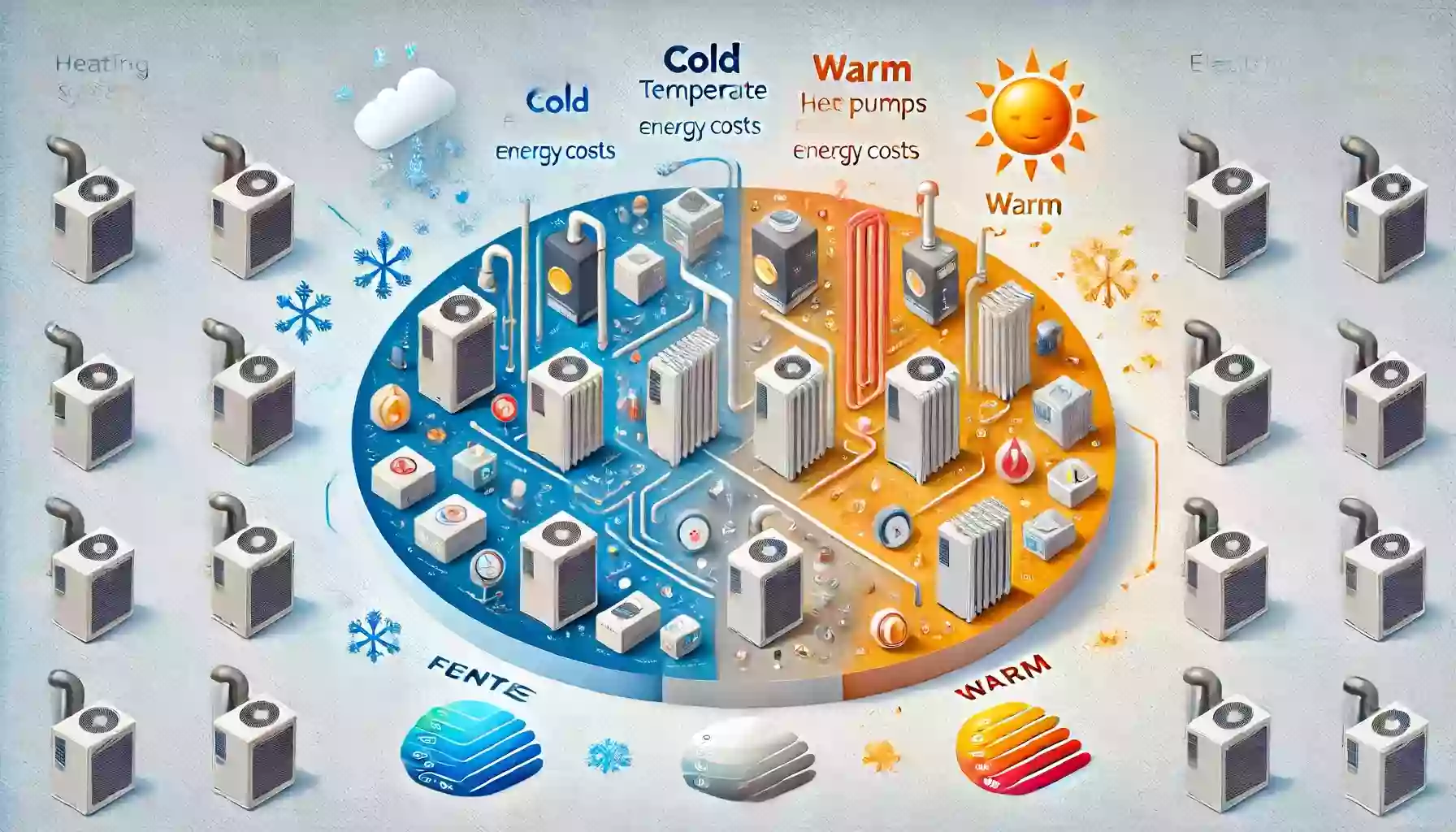How to choose an effective heating system: types of systems and electricity costs

How to choose the optimal heating system
Factors affecting electricity costs and the choice of heating system for the home
Channel air conditioning systems: selection and efficiency
“How to choose an efficient heating method for small houses”
Heating system selection:
This is an important aspect that directly affects the comfort and expenses in your home. An efficient heating system not only provides warmth but also significantly reduces energy bills.
Exploring various options:
To choose the optimal heating system, it is necessary to explore the various options available on the market. There are many types of heating systems, each with its own features, energy consumption, and cost. Before making a decision, it is important to familiarize yourself with the different aspects of heating systems and select the most suitable option.
Key factors of effectiveness:
A key factor in the efficiency of a heating system is climate conditions. For example, in temperate climate zones, heat pumps may be more efficient than furnaces. However, in harsh winters, a furnace may be preferable. An indicator of system quality is the Annual Fuel Utilization Efficiency (AFUE) rating, which measures the efficiency of converting energy into heat.
Taking into account the features of your home:
When choosing a heating system, it's important to consider not only a high AFUE rating but also the system's compatibility with your home's energy source. This will help optimize heating costs and improve the system's efficiency.
Using smart solutions:
In addition, smart solutions and tricks can be used to reduce heat loss in the home. These can be various technologies and innovations that can help make the heating system more efficient.
Making an important decision:
Choosing a heating system is an important decision that should be made considering the specifics of your home and your needs. By thoroughly exploring various options and consulting with professionals, you can select the optimal heating system that will ensure comfort and save on heating costs in your home.
Factors affecting electricity expenses
The actual electricity expenses depend on many factors. It's important to consider the area of the space, its insulation, thermostat settings, the operating time of the heating system, climate conditions, and the cost of electricity.
Consider the example of annual electricity costs in a subtropical maritime climate like Italy, Australia or Portugal. If you live in a colder region, these costs can increase significantly.
Types of heating systems
There are various types of heating systems, classified into central heating and heating of individual rooms. The choice between them depends on your needs.
Central heating is suitable for heating the entire house, while a local heater will be more effective in specific areas.
Multi-split systems
Multi split systems are one of the popular central heating options. They are based on a heat pump to extract heat from the surrounding air.
These systems offer high energy efficiency, the ability to heat various spaces, and even cooling. However, it should be noted that they can be noisy and may require additional investments for purchase, installation, and power supply.
Energy efficiency assessment
When assessing energy efficiency, the annual electricity costs for a small house of 100 square meters can range from $451 to $602. Consider all the listed factors when choosing a heating system for your home.

Channel air conditioning system with supply ventilation
This system is a complete solution that provides heating and cooling of the living space through ducts located in the under-roof space. Room temperature is controlled by a thermostat, allowing different temperature settings for different areas of the house.
Energy consumption:The electricity expenses for a 100 m² home can range from $645 to $902 per year, depending on the energy efficiency of the system.
Gas duct heating
To operate this system, indoor air is supplied to the gas furnace for heating and then distributed through ductwork throughout the home.
29 January
9 October 2024
9 October 2024
29 September
Advantages:Quick heating of the house and the ability to zone for resource savings.
Gas hydraulic heating
This system is based on heating water in a gas boiler and distributing heat throughout the house via radiators, pipes, or fan coils. It is characterized by low noise levels and comfortable warmth without drafts.
Temperature changes:The heating of the rooms happens more slowly, but the thermostat allows for temperature regulation.
When calculating electricity for a small house of100 m², it is important to consider energy efficiency. Electric heating using heating cables in a concrete slab is an innovative heating method that provides constant warmth throughout the day, especially in cold conditions. Despite their efficiency, such systems consume large amounts of energy.
Another option is a solar system that uses solar energy to maintain a comfortable indoor temperature. This is an eco-friendly and cost-effective system that requires significant investment during installation, but will help reduce electricity bills over time.
For heating individual rooms, you can consider using room air conditioners, such as split systems. They are affordable and effective heating options. Additionally, stationary electric heaters can be a good choice for spaces with low thermal insulation.
Environmental aspects of heating
When choosing between pellet stoves and wood burning stoves for heating, it is worth paying attention to their ecological component. Pellet stoves pollute the environment much less, which is becoming an important aspect in today's environmentally and sustainability-oriented world.
Central heating and its costs
A motivating factor for using pellet stoves is their eco-friendliness and minimal impact on the environment. For a house with an area of 100 m², the cost of electricity needed for heating can reach $1,170 per year. Cheaper and more economical heating methods for the home deserve serious consideration.
The efficiency of fireplaces as heat sources
Gas and wood fireplaces mainly serve as elements of interior design rather than effective sources of heat. However, a properly set up fireplace with a sealed glass door and a good air intake system can effectively provide the necessary warmth.
Heating systems: from efficiency to costs
The most economical heating systems are multi-split air conditioners and room air conditioners, thanks to their efficiency and low operating costs. On the other hand, electric heating, solar panels, and wood stoves can be more expensive options.
Tips for effective heating
To heat your home more cheaply, it's important to follow a few simple tips for efficient heating. Maintain an optimal temperature in your home, regularly service your heating system, and insulate your house to minimize heat loss.
Optimization of central heating
Maintain the temperature between18-20°C for maximum efficiency and energy savings. Clean air filters regularly and follow heater maintenance instructions.
Reducing heat loss in the house
Insulate the ceiling, walls, and floor to prevent heat loss and save up to 50% on heating costs. Protect your home from drafts by checking doors, windows, and other openings. Monitor the arrangement of furniture to avoid blocking radiators and other heat sources.
Comment
Popular Posts
9 October 2024
9932
9 October 2024
1484
29 September
327
Popular Offers

Subscribe to the newsletter from Hatamatata.com!
Subscribe to the newsletter from Hatamatata.com!
I agree to the processing of personal data and confidentiality rules of Hatamatata














